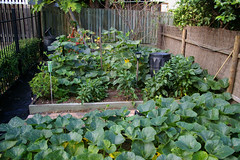If you decide to grow herbs and vegetables in your own garden, then you will have the satisfaction of knowing that you have not sprayed poisonous pesticides anywhere near them. You can eat your own home grown food without worrying about what has been done to it.
| The aromatic herb garden. (Photo credit: Wikipedia) |
So what is the first thing to do when starting your own organic garden? You will need to prepare a small garden plot. You can do this by hand digging, with the use of a machine, or use the no-dig method. If the land that you are working with is overgrown and has never been used for a garden before, you will probably need to hire a machine. Otherwise, start small by digging a manageable area. Or, if you would like to try gardening without digging, try the lasagna gardening method. This is pretty easy for beginners, and you can use it in areas that have never been gardened before.
Then you can start planting. Be sure to choose correct plants for the season. Whatever time of year it is, in most areas you can find something that can be planted right now. Choose plants whose colors or fruits you will enjoy, and don't plant them too close together.
If you have just moved to a house that already has a garden, the first thing that you should do is try to identify all the plants that are there already. You can draw a plan of your garden and write down all of the names. If you have a wireless internet connection, the easiest way to identify the plants is probably to take your laptop into the garden and call up some pictures of popular garden plants and weeds. Then you can pull out anything that is obviously a weed.
| (Photo credit: RaeAllen) |
Of course, if you simply avoid using chemical pesticides and fertilizers then technically your garden will not be organic. For that, you would need to use organic seeds too. These are available from many online suppliers. But if you can't find them, don't worry about it too much - most of what matters is what is in your soil, and what you put in the garden yourself which the plants will absorb.
Gardening is a wonderful activity that keeps you fit, makes your home more beautiful and brings an aspect of your life into harmony with nature. Gardening for beginners the organic way can be one of the most rewarding hobbies that you could imagine.
And if you're wondering about growing other foods yourself, besides vegetables and herbs in the garden, be sure to check back next week when we're going to discuss raising your own chickens!



No comments:
Post a Comment